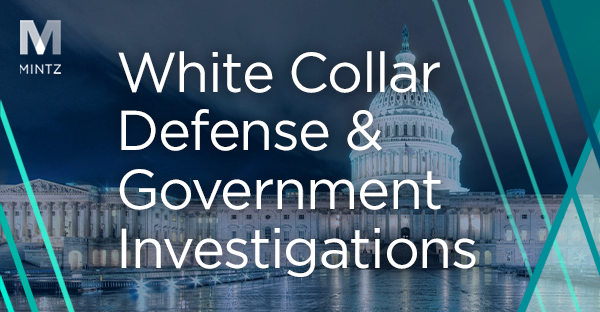
Health Care Enforcement & Investigations
Viewpoints
Filter by:
2026 False Claims Act Statistical Year in Review
February 13, 2026 | Article
In our annual report, we examine the data and explore health care enforcement trends and likely targets of government scrutiny for 2026 and beyond.
DOJ Criminal Fraud Section 2025 Year in Review – Health Care Fraud Is Front and Center
February 6, 2026 | Blog | By Karen Lovitch, Eoin Beirne, Nick A. LaPalme
On January 22, 2026, the Department of Justice (DOJ or the Department) Criminal Fraud Section issued its 2025 Year in Review summary (YIR Summary). Our more detailed analysis of the full YIR Summary can be found here. DOJ’s Health Care Fraud Unit (the HCF Unit) is focused on “prosecuting complex health care fraud matters and cases involving the illegal prescription, distribution, and diversion of controlled substances.” To carry out its mission, in 2025, the HCF Unit operated 8 Health Care Fraud Strike Forces in 26 federal judicial districts across the nation. The HCF Unit’s reported average return on investment is $106.76 per $1 spent.
DOJ Criminal Fraud Section 2025 Year in Review: Major Reorganization Confirms Shifting Enforcement Landscape
January 30, 2026 | Blog | By Eoin Beirne, Nick A. LaPalme
The Department of Justice's (DOJ or the Department) Criminal Fraud Section has undergone its most significant reorganization in years, according to its recently released 2025 Year in Review. Those changes and the current climate of enforcement uncertainty require more vigilance, not less, from corporate compliance and law departments.
EnforceMintz — Health Care Enforcement Trends & 2026 Outlook
January 21, 2026 | Article
The Eliminating Kickbacks in Recovery Act in 2025: New Developments and New Questions for Laboratory Sales Compensation — EnforceMintz
January 20, 2026 | Article | By David Gilboa, Samantha Kingsbury, Karen Lovitch
Learn the latest on EKRA enforcement and compensation rules for laboratory sales and marketing employees after the Ninth Circuit’s Schena decision. Explore DOJ’s stance, open compliance questions, and similar state law impacting clinical laboratories.
Cybersecurity-Related Enforcement Under the False Claims Act in 2025: New Settlements, Same Lessons — EnforceMintz
January 20, 2026 | Article | By Keshav Ahuja, Samantha Kingsbury
Discover key False Claims Act cybersecurity enforcement trends from 2025, including major DOJ settlements with defense contractors and health care companies. Learn best practices for compliance, self-disclosure, and risk mitigation as enforcement intensifies in 2026.
Medicare Advantage Under the Microscope: Enforcement Priorities and Legal Battles — EnforceMintz
January 20, 2026 | Article | By Tara E. Dwyer, Caitie Hill, Melody Mathewson
Explore 2025 managed care enforcement trends under the Trump administration. Learn about DOJ and CMS priorities, Medicare Advantage risk adjustment cases, key cases interpreting regulatory changes, and compliance strategies for MAOs.
Qui Tam Quandaries: False Claims Act at a Constitutional Crossroads — EnforceMintz
January 20, 2026 | Article | By Grady Campion, Alexa Greco, Clare Prober
Explore key constitutional challenges to the False Claims Act, including Article II disputes over qui tam provisions and Excessive Fines Clause litigation. Learn how recent court decisions impact FCA enforcement and penalty limits in 2026.
Streamlined DOJ Resolutions: Declinations, NPAs, and DPAs Explained — EnforceMintz
January 20, 2026 | Article | By Eoin Beirne, Nick A. LaPalme
Learn how DOJ’s expanded Voluntary Self-Disclosure policy and evolving use of NPAs and DPAs create new opportunities for health care companies to resolve enforcement actions. Explore strategies for cooperation, remediation, and compliance.
The Old, the New, and the Unknown: Consumer Protection Enforcement Activity in Health Care — EnforceMintz
January 20, 2026 | Article | By Hope Foster, Lexie Gallo-Cook, Jane Haviland, Samantha Kingsbury
Explore how consumer protection regulators tackled health care issues in 2025, from GLP-1 weight loss drugs to AI oversight and pricing transparency. Learn what enforcement trends mean for health care companies in 2026.
Health Care Enforcement Under Trump 2.0: Leadership Shakeups and Shifting Priorities — EnforceMintz
January 20, 2026 | Article | By Jane Haviland, Karen Lovitch
Explore DOJ health care enforcement trends under Trump 2.0. Learn how leadership changes, new False Claims Act (FCA) priorities, and political initiatives like gender-affirming care investigations are reshaping compliance risks for 2026.
Q&A with Former US Attorney Erek L. Barron on Enforcement Trends, Qui Tam Risks, and Strategic Opportunities — EnforceMintz
January 20, 2026 | Article | By Erek Barron, Grady Campion
Explore DOJ False Claims Act enforcement trends for 2025–2026 with insights from former US Attorney Erek Barron. Learn about data-driven investigations, AI risks, compliance strategies, and opportunities for self-disclosure.
Preventing False Claims Act Retaliation Claims: What Every Company Should Know — EnforceMintz
January 20, 2026 | Article | By LisaMarie Collins, Ashley Markson, Natashia Tidwell
Discover how health care organizations can prevent False Claims Act (FCA) retaliation claims. Learn best practices for compliance programs, whistleblower risk management, documentation protocols, and legal privilege strategies to reduce FCA litigation exposure.
From Innovation to Regulation: Health Care Enforcement Related to AI — EnforceMintz
January 20, 2026 | Article | By Daniel Cody, Molly Connolly, Jordyn Flaherty, Samantha Kingsbury, Karen Lovitch
Explore how AI is reshaping health care enforcement in 2026. Learn about emerging state regulations, federal oversight, enforcement risks, and best practices for compliance in an evolving AI-driven landscape.
Summer Roundup: OIG Issues Multiple Advisory Opinions Relevant to Manufacturers
September 23, 2025 | Blog | By Rachel Yount
Over the 2025 summer, the Department of Health and Human Services’ Office of Inspector General (OIG) issued four advisory opinions—two favorable and two unfavorable—that provide valuable guidance for medical device companies and pharmaceutical manufacturers navigating the federal Anti-Kickback Statute (AKS). These opinions address warranty reimbursements, vendor access fees, physician ownership, and exclusion screening costs. Below is a summary of each.
Recent Criminal Convictions Highlight Risks in Offering Gift Cards to Patients
September 9, 2025 | Blog | By Rachel Yount
In a cautionary tale for health care entities, the U.S. Attorney’s Office for the Eastern District of North Carolina recently announced the convictions of two health care executives who admitted to orchestrating a multi-year kickback scheme involving the use of gift cards to incentivize Medicaid patients to attend counseling sessions and submit urine drug tests. Although the Department of Health and Human Services’ Office of Inspector General (OIG) has issued multiple Advisory Opinions green-lighting other programs that include gift card distributions, these convictions underscore the importance of structuring patient incentives in strict accordance with OIG guidance.
“False” Sense of Security: DOJ Announces False Claims Act Settlements Related to Failure to Comply with Cybersecurity Requirements
August 4, 2025 | Blog | By Eoin Beirne, Karen Lovitch, Keshav Ahuja
On July 31, 2025, the United States Department of Justice (DOJ) announced a pair of settlements with companies accused of having violated the False Claims Act (FCA) by falsely representing their compliance with certain cybersecurity requirements applicable to federal contractors. These two settlements highlight key aspects of DOJ’s enforcement priorities: (1) DOJ’s strong focus on enforcing the FCA in the cybersecurity space, and (2) DOJ’s willingness to reward companies that self-disclose violations. All government contractors certifying compliance with regulatory and contractual requirements must stay vigilant and take the steps needed to comply.
Webinar Recording: DOJ Enforcement in the Trump Administration: Priorities, Shifts, and Legal Impacts
June 18, 2025 | Webinar | By Eoin Beirne, Erek Barron, Karen Lovitch, Jennifer Rubin
This in-depth webinar examines DOJ’s enforcement priorities and topics such as recent False Claims Act settlements (which go beyond health care fraud), enforcement risks and best practices, and whistleblower risks and protections from an employment law perspective.
Voluntary Self-Disclosure and Whistleblower Awards Initiatives Are Alive and Well in 2025: DOJ Issues White-Collar Enforcement Priorities for the New Administration
May 22, 2025 | Advisory | By Eoin Beirne, Nick A. LaPalme, Andrew Tucker Bobbitt
The first 120 days of the Trump administration have been characterized by dramatic changes in the realm of white-collar enforcement. Recently issued memoranda and policy guidance from DOJ contains critical details regarding the new administration’s enforcement priorities.
Noteworthy False Claims Act Settlement Demonstrates DOJ’s Continued Scrutiny of Arrangements Between Hospitals and Physician Practices
May 19, 2025 | Blog | By Daniel Cody, Jane Haviland, Rachel Yount
On May 14, 2025, Fresno Community Hospital and Medical Center d/b/a Community Health System (CHS) and its technology partner, Physicians Network Advantage, Inc. (PNA), agreed to pay $31.5 million and enter into a Corporate Integrity Agreement to settle allegations of violating the federal anti-kickback statute (AKS) and physician self-referral law (Stark Law) under the False Claims Act (FCA). The alleged conduct at issue revolved around CHS’s plan beginning in 2013 to assist local area physicians in their adoption of the electronic health records (EHR) platform used by CHS and its establishment of PNA to support that goal. For decades, the government has strongly promoted the adoption of interoperable EHR platforms by physician practices (e.g., Meaningful Use payments), given that EHR systems allow for better care coordination, increased efficiency, and improved patient experience. Moreover, as described in more detail below, the Department of Health and Human Services (HHS) adopted an AKS safe harbor and Stark Law exception that allowed certain entities, including hospitals, to donate EHR technology and services to physicians if certain conditions are satisfied. However, CHS’s and PNA’s alleged conduct exceeds what is permissible under the relevant safe harbor and exception.
Explore Other Viewpoints:
- Data Centers & Digital Infrastructure
- AI: The Washington Report
- Antitrust and Federal Regulation
- Appellate
- Arbitration, Mediation & Alternate Dispute Resolution
- Artificial Intelligence
- Awards
- Bankruptcy & Restructuring
- California Land Use
- Cannabis
- Class Action
- Complex Commercial Litigation
- Construction
- Consumer Product Safety
- Corporate Governance (ESG)
- Cross-Border Asset Recovery
- DEI Legal Developments
- Debt Financing
- Direct Investing (M&A)
- Diversity
- EB-5 Financing
- Education & Nonprofits
- Employment
- EnforceMintz
- Environmental (ESG)
- Environmental Enforcement Defense
- Environmental Law
- Environmental, Social, and Corporate Governance (ESG)
- FDA Regulatory
- FDA in Flux
- False Claims Act
- Federal Circuit Appeals
- Financial Institution Litigation
- Government Law
- Growth Equity
- Health Care
- Health Care Compliance, Fraud and Abuse, & Regulatory Counseling
- Health Care Enforcement & Investigations
- Health Care Transactions
- Health Information Privacy & Security
- IP Due Diligence
- IPRs & Other Post Grant Proceedings
- Immigration
- Impacts of a New US Administration
- Insolvency & Creditor Rights Litigation
- Institutional Investor Class Action Recovery
- Insurance & Financial Services
- Insurance Consulting & Risk Management
- Insurance and Reinsurance Problem-Solving & Dispute Resolution
- Intellectual Property
- Investment Funds
- Israel
- Licensing & Technology Transactions
- Life Sciences
- Litigation & Investigations
- M&A Litigation
- ML Strategies
- Managed Care
- Medicare, Medicaid and Commercial Coverage & Reimbursement
- Mergers & Acquisitions
- Patent Litigation
- Patent Prosecution & Strategic Counseling
- Pharmacy Benefits and PBM Contracting
- Portfolio Companies
- Privacy & Cybersecurity
- Private Client
- Private Equity
- Pro Bono
- Probate & Fiduciary Litigation
- Products Liability & Complex Tort
- Projects & Infrastructure
- Public Finance
- Real Estate Litigation
- Real Estate Transactions
- Real Estate, Construction & Infrastructure
- Retail & Consumer Products
- Securities & Capital Markets
- Securities Litigation
- Social (ESG)
- Special Purpose Acquisition Company (SPACs)
- Sports & Entertainment
- State Attorneys General
- Strategic IP Monetization & Licensing
- Sustainable Energy & Infrastructure
- Tax
- Technology
- Technology, Communications & Media
- Technology, Communications & Media Litigation
- Trade Secrets
- Trademark & Copyright
- Trademark Litigation
- Unified Patent Court (UPC)
- Value-Based Care
- Venture Capital & Emerging Companies
- White Collar Defense & Government Investigations
- Women's Health and Technology





